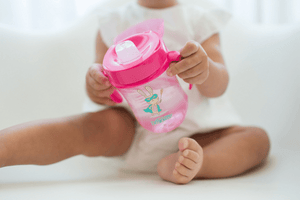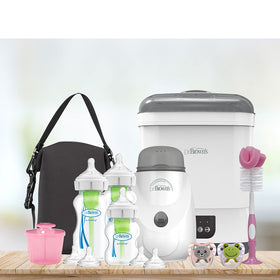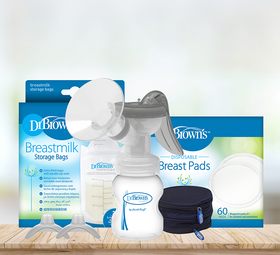
Do Probiotics Help Reduce Baby Colic? What the Research Says
How Gut Health Connects to Crying
If you’ve ever seen or heard how colic affects a baby, then you’d probably not wish it on anyone. The unrest, the anxiety, the helplessness a parent feels seeing their baby in such pain… without knowing the cause or what to do about it.
You burp, soothe, change bottles, switch formulas, anything to make it stop. But sometimes, nothing works.
That’s because colic doesn’t always mean your baby has trapped gas or digestion problems, or that your feeding method is wrong. It could be a normal, even necessary, stage of development happening inside their tummy.
Research suggests that it might be your baby’s gut, brain, and nervous system learning to communicate for the first time. And that’s where probiotics come in.
Scientists in Australia and around the world are exploring how tiny, beneficial bacteria might help guide this gut-brain connection, easing discomfort and helping babies (and parents) find calmer days.
1. The Gut–Brain Connection
Your baby’s gut isn’t just for digestion, but communication. It’s connected directly to the brain through the vagus nerve, sending constant signals about comfort, hunger, and stress.
A review from the Murdoch Children’s Research Institute (MCRI) has shown that early imbalances in gut bacteria can influence these signals. Babies with fewer beneficial bacteria, such as Bifidobacterium, often exhibit more crying episodes and sensitivity.
Probiotics may help by supporting the growth of calming bacteria, which produce natural compounds that communicate “all clear” messages to the brain.
In short, probiotics might not silence crying instantly, but they can help train your baby’s internal communication system to settle faster over time.
2. Colic as a Gut Milestone, Not a Disorder
Australian pediatric experts increasingly describe colic as a phase of adjustment, not a permanent problem.
At birth, your baby’s digestive tract is nearly sterile. Over the next few months, it becomes home to billions of bacteria, a developing ecosystem known as the microbiome.
A 2022 review by the Australian Journal of General Practice found that this rapid bacterial colonisation can cause gas, bloating, and fussiness as the gut “learns” to digest milk efficiently.
So when parents notice the classic colic symptoms, crying at the same time every evening, tummy tightness, knees pulling up, they’re often witnessing that adjustment in real time.
Probiotics help by gently steering this process, introducing beneficial strains that crowd out gas-producing bacteria and promote smoother digestion.
3. Probiotics differ; strain specificity matters
Here’s where things get tricky: saying “probiotics help” is like saying “medicine works”. Which one? For what?
Murdoch Children’s Research Institute tested the most studied probiotic strain for colic, Lactobacillus reuteri DSM 17938, in over 1,800 infants across multiple countries, including Australia.
The results were fascinating:
-
Breastfed babies showed reduced crying time by up to 50% within a few weeks.
-
Formula-fed babies? No measurable difference.
That means effectiveness depends on how your baby is fed and which bacteria dominate their gut environment.
So while probiotic drops (like those containing L. reuteri or Bifidobacterium infantis) can help some babies, they’re not a universal fix.
Probiotics shouldn’t be seen as “medicine,” but as support, a small nudge toward balance rather than an instant cure.
4. Feeding Habits Influence Gut Health More Than Supplements Alone
How you feed affects your baby’s microbiome as much, if not more than any probiotic product. Studies by PMC show that:
-
Breastfed babies tend to have microbiomes rich in Bifidobacteria, thanks to human milk sugars (HMOs).
-
Formula-fed babies develop more diverse gut bacteria, which can be perfectly healthy, but sometimes take longer to stabilise.
Bottle position, flow rate, and burping frequency also matter. Feeding too quickly can increase swallowed air, and feeding too slowly can cause frustration; both disrupts digestion and gas balance.
That’s why combining good feeding technique (upright position, slow-flow teats, and anti-colic bottles) with probiotics can make a measurable difference.
That means, probiotics would work well if your feeding routine gives them a chance.
5. Why “Witching Hour” Might Be a Gut Cycle
You might notice your baby’s worst crying happens in the late afternoon or evening, often called the “witching hour.”
Studies from the PMC link this timing to the baby’s developing circadian rhythm, the body clock that also influences gut function.
During late hours, the gut’s motility slows slightly while bacterial fermentation peaks. Leading to more gas production and tummy tension, while parents are trying to wind down.
Probiotics can help rebalance this rhythm by promoting bacteria that support smoother digestion across the day. But again, it’s gradual, not overnight magic.
So yes, there’s science behind the “evening meltdown”; give your baby’s microbiome time to find its daily rhythm.
What the Research Really Says (In Plain English)
|
What Science Confirms |
What It Doesn’t |
|
Certain probiotics (like L. reuteri) can reduce crying in breastfed babies with colic【MCRI, 2023】 |
They don’t work for all babies, especially if formula-fed. |
|
A balanced microbiome helps digestion and mood regulation【PMC, 2022】 |
Probiotics are not a cure-all or instant fix. |
|
Feeding routines, hygiene, and bottle design affect gut comfort【PMC, 2012】 |
Supplements can’t replace good feeding habits. |
|
Colic is a normal, developmental stage, not a disease【AJGP, 2022】 |
Crying doesn’t always mean medical distress. |
Should You Try Probiotics for Colic?
If your baby cries for long periods without another clear cause, it’s worth discussing probiotics with your GP or child health nurse, especially if your baby is breastfed.
Look for drops with the clinically studied L. reuteri DSM 17938 strain, and give them a few weeks to work.
But remember: the most effective plan usually combines
-
Gentle feeding rhythm,
-
Anti-colic bottles that reduce swallowed air
-
and a calming bedtime environment.
Colic almost always resolves by 3–4 months; The probiotics just help your baby’s tummy get there a little more comfortably.
For more support on feeding techniques and bottle systems that promote healthy digestion, visit drbrowns.com.au.







